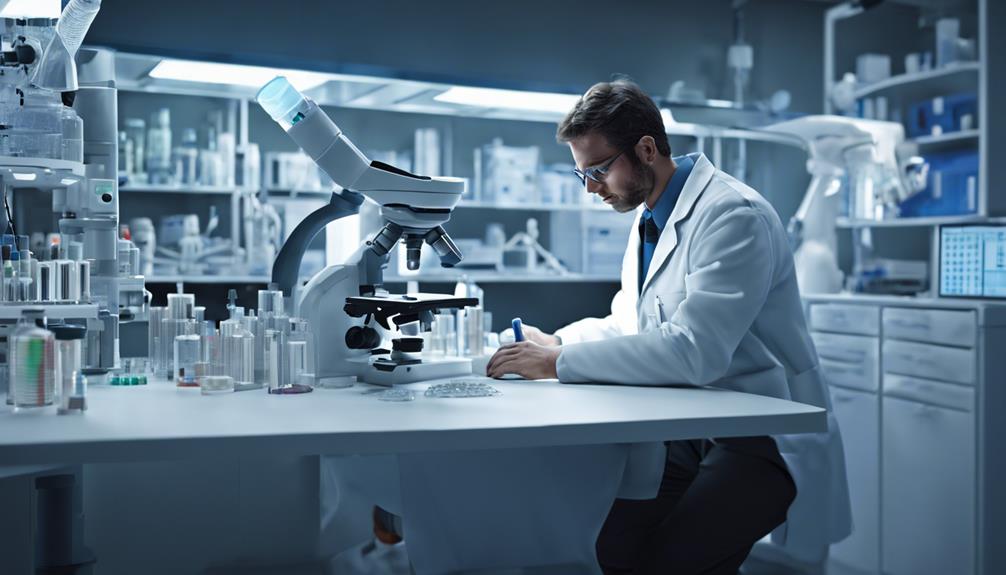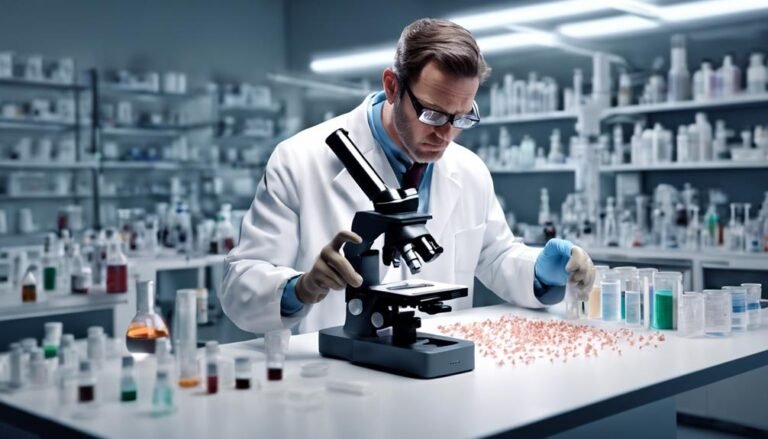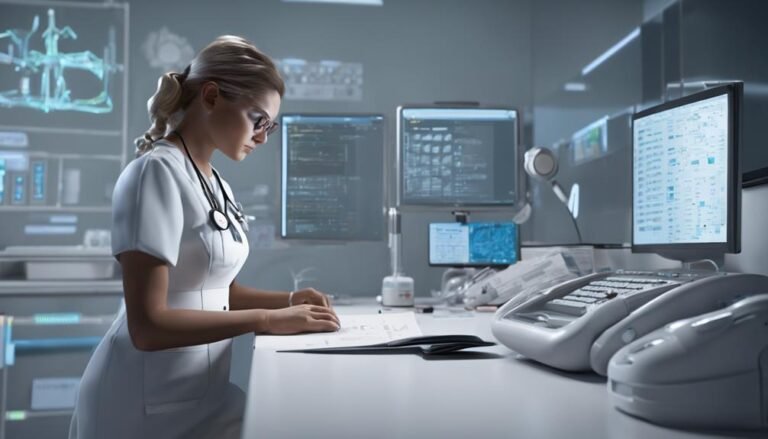Medical Technologist Job Description
As a medical technologist, you'll conduct intricate laboratory analyses on samples like blood and tissue for accurate diagnoses. Operating and maintaining equipment is essential for precise results. Strict adherence to protocols and quality control measures guarantees reliability. Your meticulous data recording aids in patient care and collaboration with healthcare professionals. Analytical skills play a key role in interpreting data accurately and troubleshooting issues efficiently. Calibrating instruments meticulously and maintaining accuracy is crucial. Effective communication and patient interaction skills enhance your role in healthcare. Discover more about the diverse career opportunities and skills needed for success in this impactful field.
Key Takeaways
- Perform complex laboratory tests on various samples for accurate diagnoses.
- Maintain and calibrate laboratory equipment to ensure precise results.
- Adhere to strict quality control measures for reliable testing outcomes.
- Collaborate with healthcare professionals to interpret and communicate test results.
- Utilize analytical skills and attention to detail for effective data analysis.
Educational Requirements
To become a medical technologist, you must typically complete a bachelor's degree in medical technology or a related field. This educational requirement guarantees that you have a solid understanding of the scientific principles and laboratory techniques necessary for this role. Additionally, many employers prefer candidates who've completed an accredited program to make sure that you have received a high-quality education.
Continuing education is also vital in this field to stay current with advancements in technology and medical practices. Medical technologists often need to participate in ongoing training programs and workshops to enhance their skills and knowledge. This commitment to continuing education demonstrates your dedication to providing the highest level of patient care and staying abreast of industry developments.
Certification requirements are another essential aspect of becoming a medical technologist. While certification requirements can vary by state and specialty, obtaining certification from organizations such as the American Society for Clinical Pathology (ASCP) can boost your credibility and job prospects in this competitive field. Meeting these certification requirements showcases your competency and commitment to meeting industry standards.
Job Duties
Medical technologists perform a wide range of essential tasks in clinical laboratories to aid in the diagnosis and treatment of patients. As a medical technologist, you play an important role in the healthcare system by conducting various laboratory tests with accuracy and precision. Some of the key job duties include:
- Performing complex analyses on blood, tissue, and bodily fluids to provide valuable data for physicians.
- Operating and maintaining laboratory equipment to guarantee accurate results and smooth workflow.
- Following strict protocols and quality control measures to secure the reliability of test results.
- Recording and analyzing data meticulously to assist in patient care and treatment decisions.
- Collaborating with healthcare professionals to interpret findings and contribute to the overall diagnosis process.
Engaging in these job duties can provide you with a sense of job satisfaction and contribute to a healthy work-life balance. Additionally, there are ample opportunities for professional development and career advancement within the field of medical technology.
Laboratory Skills
With a focus on Laboratory Skills, your proficiency in conducting precise analyses and maintaining equipment is vital for guaranteeing accurate test results in clinical settings. As a medical technologist, your expertise in various laboratory techniques such as microscopy, microbiology, and molecular biology plays a pivotal role in diagnosing illnesses and monitoring patient health. Your ability to adhere to strict protocols and quality control measures ensures the reliability of test results, leading to effective patient care.
Moreover, honing your laboratory skills opens up numerous career advancement opportunities within the healthcare industry. By staying updated on the latest technological advancements and participating in continuing education programs, you can expand your skill set and expertise. This not only enhances your job performance but also increases your chances of progressing to supervisory or managerial roles in the laboratory setting. Embracing continuous learning and mastering new laboratory techniques are key steps towards a successful and fulfilling career as a medical technologist.
Analytical Abilities
You must possess key analytical skills to excel as a medical technologist, requiring you to interpret complex data accurately.
Your problem-solving capabilities will be put to the test when troubleshooting equipment or identifying irregular test results.
Critical thinking proficiency is essential in evaluating laboratory procedures and ensuring accurate diagnoses are made based on test outcomes.
Key Analytical Skills
Developing strong key analytical skills is essential for success as a medical technologist in accurately interpreting and analyzing complex laboratory data. To excel in this aspect, focus on honing the following key analytical skills:
- Critical Thinking: Evaluate information systematically and make logical conclusions.
- Attention to Detail: Guarantee accuracy and precision in analyzing test results.
- Data Interpretation: Understand and interpret laboratory data effectively.
- Problem Recognition: Identify abnormalities or inconsistencies in test results.
- Quality Control Analysis: Implement measures to secure the reliability of test results.
Problem-Solving Capabilities
Improving problem-solving capabilities is essential for medical technologists to effectively leverage their analytical abilities in resolving complex issues within laboratory settings. Utilizing problem-solving techniques and innovative solutions is vital in addressing diverse challenges that may arise during testing procedures. Medical technologists must employ critical thinking and decision-making strategies to troubleshoot equipment malfunctions, interpret abnormal results, and optimize workflow efficiency.
Critical Thinking Proficiency
Mastering critical thinking proficiency is paramount for medical technologists, as it enhances your analytical abilities to navigate complex laboratory challenges with precision and expertise. To excel in this area, focus on:
- Decision Making: Utilize critical thinking to make sound judgments in high-pressure situations.
- Problem Solving: Apply logical reasoning to identify issues and develop effective solutions.
- Analyzing Data: Interpret and evaluate laboratory results with a keen eye for detail.
- Thinking Creatively: Generate innovative approaches to overcome obstacles in testing procedures.
- Prioritizing Tasks: Use critical thinking to organize your workload efficiently and meet deadlines effectively.
Quality Control
You must maintain accuracy in testing to uphold the reliability of results.
Complying with standards measures is essential for maintaining quality control processes.
Implementing precise instrument calibration procedures is vital to guarantee accurate test outcomes.
Accuracy in Testing
To guarantee the accuracy of testing results, meticulous attention to detail and adherence to quality control protocols are essential practices for medical technologists. When ensuring accuracy in testing, consider the following:
- Test Result Interpretation: Carefully analyze and interpret test results to identify any discrepancies or irregularities.
- Error Detection: Thoroughly review testing processes to catch any errors that may impact result accuracy.
- Measurement Precision: Maintain precision in all measurements taken during testing procedures to minimize the margin of error.
- Result Validation: Validate test results through repeat testing or alternative methods to confirm their accuracy.
- Quality Control Compliance: Strictly adhere to quality control measures and protocols to uphold the accuracy and reliability of testing outcomes.
Standards Compliance Measures
Maintaining strict adherence to quality control measures and protocols is essential to ensuring standards compliance in medical technology testing processes. Regulatory requirements play an important role in dictating the standards that must be upheld.
Compliance audits are conducted to assess the adherence to these regulations, ensuring that all processes meet the required criteria. Performance evaluations are vital to monitor the quality of testing procedures and the accuracy of results.
Additionally, proficiency assessments are utilized to gauge the competency of medical technologists in performing their duties accurately. By consistently implementing these quality control measures, medical technologists can uphold the highest standards in testing procedures, ensuring the reliability and accuracy of medical diagnostic results.
Instrument Calibration Procedures
Implementing meticulous instrument calibration procedures is essential in maintaining the precision and reliability of medical technology testing processes. To guarantee accurate results and efficient operations, consider the following key points:
- Regular equipment maintenance is vital for peak performance.
- Utilize troubleshooting techniques to identify and rectify calibration issues promptly.
- Follow precision calibration techniques to fine-tune instrument accuracy.
- Conduct regular accuracy checks to ensure reliable test results.
- Document all calibration procedures meticulously to track changes and maintain consistency.
Equipment Operation
Operate medical laboratory equipment efficiently and accurately to guarantee precise results. As a medical technologist, it is essential to not only understand the intricacies of the equipment but also stay updated on technology advancements and innovation trends to ensure top-notch performance. Regular equipment maintenance and troubleshooting are key aspects of maintaining the functionality of the devices you work with. By following proper maintenance schedules and promptly addressing any issues that arise, you contribute to the reliability and accuracy of test results.
| Equipment | Description | Maintenance | Troubleshooting |
|---|---|---|---|
| Microscope | Used for examining blood cells and microorganisms | Clean lenses regularly | Check for blurry images |
| Centrifuge | Separates substances of different densities | Balance rotor before each use | Address unusual noises |
| Incubator | Provides controlled environment for specimen growth | Monitor temperature settings | Investigate fluctuations in temperature |
| Spectrophotometer | Measures light absorption to quantify substances | Wipe cuvettes after each use | Calibrate if readings are inconsistent |
Being proficient in the operation of these instruments is essential for accurate test results and overall laboratory efficiency.
Data Analysis
You must possess strong data interpretation skills as a medical technologist to analyze complex medical data accurately.
Proficiency in statistical analysis is essential for drawing meaningful conclusions from research findings and patient test results.
Your ability to interpret and analyze data plays a pivotal role in ensuring accurate diagnoses and effective treatment plans for patients.
Data Interpretation Skills
Developing strong data interpretation skills is essential for medical technologists to accurately analyze and draw meaningful conclusions from complex data sets. To excel in this area, you should focus on the following key aspects:
- Data visualization techniques: Mastering various methods to present data visually aids in identifying patterns and trends.
- Statistical software proficiency: Being adept at using statistical software enhances your ability to analyze data effectively.
- Clinical correlation: Connecting data findings to clinical scenarios is critical for providing accurate interpretations.
- Result interpretation: Understanding how to interpret results accurately guarantees the reliability of your analyses.
- Attention to detail: Paying close attention to even the smallest data points is paramount in drawing accurate conclusions.
Statistical Analysis Proficiency
To excel in statistical analysis proficiency, focus on mastering key statistical methods and software tools.
Understanding data visualization techniques is essential for effectively communicating insights gleaned from data.
Utilize statistical modeling approaches to analyze trends, patterns, and relationships within datasets.
Proficiency in software such as R, Python, or SPSS can streamline the statistical analysis process and enhance your ability to draw meaningful conclusions.
Familiarize yourself with various statistical tests like t-tests, ANOVA, regression analysis, and more to determine the significance of findings accurately.
Being adept at interpreting and presenting statistical data will enable you to support evidence-based decision-making in healthcare settings.
Continuous learning and practice in statistical analysis will sharpen your skills and make you a valuable asset in the medical technology field.
Communication Skills
Effective communication plays an important role in the daily responsibilities of a medical technologist. As a medical technologist, your communication skills are essential for maintaining effective interpersonal relationships and fostering seamless team collaboration.
Here are five key aspects where strong communication skills are crucial:
- Team Collaboration: Communicating clearly with other healthcare professionals to guarantee accurate test results and patient care.
- Conflict Resolution: Addressing any discrepancies or issues that may arise during laboratory procedures promptly and professionally.
- Reporting: Clearly documenting and communicating test results to physicians and other healthcare providers for accurate diagnosis and treatment.
- Training: Effectively conveying procedures and protocols to new staff members to ensure consistency in testing methodologies.
- Feedback: Providing constructive feedback to colleagues to enhance overall lab performance and efficiency.
Patient Interaction
Your interaction with patients as a medical technologist is an essential aspect of providing thorough healthcare services. Patient care isn't limited to the clinical procedures you perform but also extends to the way you communicate and empathize with those under your care. Developing strong interpersonal skills and empathy is pivotal in creating a supportive and reassuring environment for patients undergoing tests and procedures.
Empathy plays a significant role in patient interaction, as it allows you to understand and address their concerns effectively. By actively listening and showing compassion, you can help alleviate their anxieties and build trust in the healthcare process. Patients often feel vulnerable during medical examinations, making your ability to connect with them on a personal level crucial in delivering quality care.
Your communication skills and empathetic approach contribute to the overall patient experience, shaping how they perceive the quality of care they receive. By prioritizing patient interaction and fostering a supportive atmosphere, you not only enhance their well-being but also uphold the standards of compassionate healthcare practice.
Career Opportunities
Exploring diverse career opportunities within the field of medical technology offers professionals a chance to specialize and grow their expertise in various healthcare settings. When considering your career path as a medical technologist, there are several key factors to keep in mind:
- Salary Expectations: Medical technologists generally enjoy competitive salaries with opportunities for growth based on experience and specialization.
- Work-Life Balance: Many healthcare facilities offer flexible scheduling options, allowing for a better balance between work and personal life.
- Advancement Opportunities: With additional certifications or advanced degrees, medical technologists can advance to supervisory or managerial roles within the laboratory or healthcare institution.
- Job Satisfaction: Contributing to patient care and diagnosis can be incredibly rewarding, providing a sense of fulfillment in your work.
- Continuing Education: Staying current with advancements in technology and healthcare practices is essential for career development and maintaining job satisfaction.
Frequently Asked Questions
Is Certification Required to Work as a Medical Technologist?
Yes, certification is typically required to work as a medical technologist. It validates your education and skills, potentially leading to higher salary and job satisfaction. Make sure you meet the specific certification standards in your field.
How Does a Medical Technologist Handle Specimen Collection?
To handle specimen collection properly as a medical technologist, make sure you follow the guidelines for proper technique. Conduct quality control assessments regularly to maintain accuracy and reliability in testing procedures. These steps are essential for precise results.
What Software Programs Do Medical Technologists Commonly Use?
You commonly use laboratory information systems for data analysis. Quality control and instrument maintenance are essential tasks where software programs assist. These tools streamline processes, ensuring accuracy and efficiency in your work as a medical technologist.
Can Medical Technologists Work in Specialized Areas Like Genetics?
Yes, medical technologists can work in specialized areas like genetics. They perform genetics testing using advanced laboratory techniques. Career advancement opportunities are available through specialized training in genetics, allowing you to excel in this specific field.
Do Medical Technologists Have Opportunities for Research in Their Field?
Yes, medical technologists have ample research opportunities in their field. Engaging in research projects can lead to career advancement by expanding knowledge, improving skills, and contributing to advancements in healthcare practices.
Conclusion
As a medical technologist, you play a vital role in the healthcare industry by performing various laboratory tests to help diagnose and treat patients.
Did you know that the demand for medical technologists is expected to grow by 7% from 2019 to 2029, faster than the average for all occupations?
This statistic highlights the significance of your role in the ever-evolving field of healthcare.
Keep honing your skills and expertise to excel in this rewarding career.







